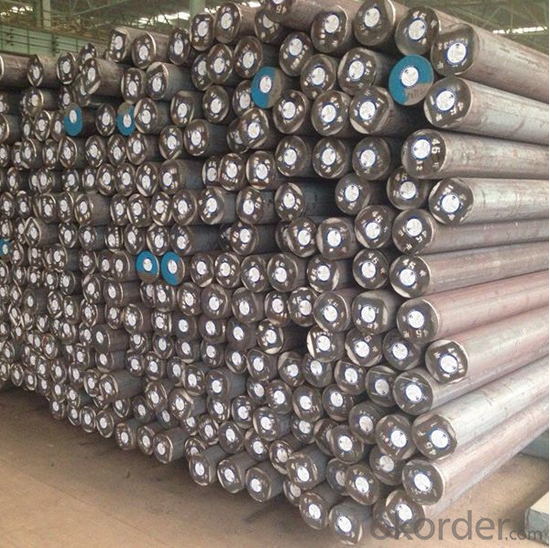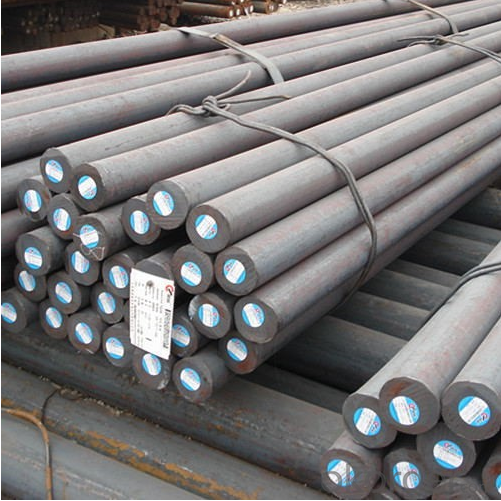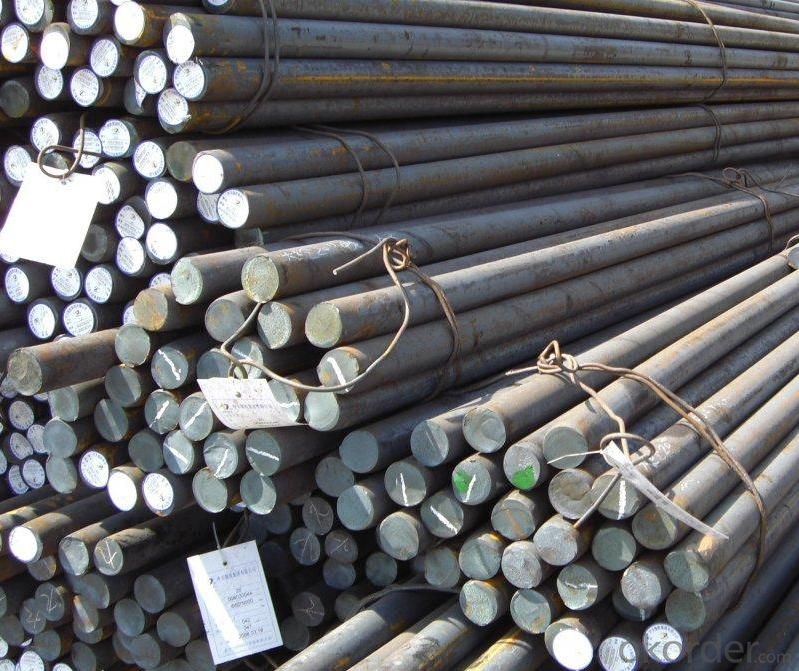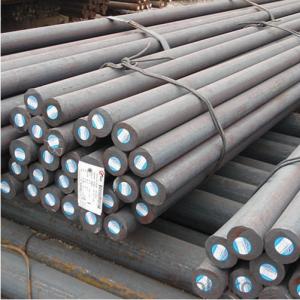C45 Steel Round Bar for Constructure Material
- Loading Port:
- Shanghai
- Payment Terms:
- TT or LC
- Min Order Qty:
- 25 m.t.
- Supply Capability:
- 500000 m.t./month
OKorder Service Pledge
OKorder Financial Service
You Might Also Like
Item specifice
C45 Steel Round Bar for Constructure Material
Product Description:
1. Sizes: Diameter: 16mm-300mm; Length: 6m, 9m, 12m
2. Grade: 45#, astm1045, S45C,C45
3. Invoicing on theoretical weight or actual weight as customer’s request
4. Shape: Round bar, solid bar of steel with circular section
5. Technique: Hot rolled, forged, cold rolled
Chemical Composition:
C | Si | Mn | P | S | Ni | Cr | Cu |
0.42-0.50 | 0.17-0.37 | 0.50-0.80 | ≤0.035 | ≤0.035 | ≤0.30 | ≤0.25 | ≤0.25 |
Packing and Delivery:
Packing in bundle with steel strips and shipped by break bulk vessel or container (depend on target market and different ports)
Delivery Detail: Approx.45 days
Usage and Applications
1. Steel round bar is used in a large number of architectural and engineering structures. Or it can be used in construction of plants for the production of steel house frames, high-voltage transmission towers, bridges, vehicles, boilers, containers, ships, etc.
2. And we can use this kind of product on the performance of the mechanical parts if the demand is not very high.
3. Some especial material steel round bar can be used for main shaft of steamer, hummer shank, with big section and supper force.
Specification:
OD | Length | Material | Standard | Technique |
16-260mm | 6-12m or aques per request | 20# | GB ASTM DIN | Hot rolled |
16-350mm | 45# | |||
200-500mm | 45# | Forged | ||
20-250mm | 20Cr,40Cr,20-42CrMo | Hot rolled | ||
50-300mm | GCr15 |
Product show of C45 Steel



- Q:How does special steel contribute to the longevity of products?
- There are several ways in which special steel contributes to the longevity of products. To begin with, its exceptional strength and durability are well-known. Special steel is specifically designed to endure extreme conditions, such as high temperatures, pressure, and corrosive environments. This makes it highly suitable for use in various industries, including aerospace, automotive, and construction. The remarkable strength of special steel enables products to bear heavy loads and resist deformation, ensuring they remain intact and functional for a prolonged period of time. For example, in the construction industry, special steel is frequently employed in structural components like beams and columns, which provide crucial support and stability to buildings over many years. Furthermore, special steel possesses excellent resistance to wear and abrasion. It can endure constant friction, impact, and contact with other materials without significant deterioration. This characteristic is vital in industries where products are subjected to continuous use, such as machinery, tools, and equipment. The utilization of special steel in these applications guarantees that the products remain in good working condition for an extended period, reducing the need for frequent repairs or replacements. Additionally, special steel exhibits exceptional resistance to corrosion, making it highly resistant to rust and other forms of corrosion. This property is especially advantageous in products exposed to harsh environments or chemicals, like marine vessels, pipelines, and chemical processing equipment. Through the utilization of special steel, manufacturers can significantly prolong the lifespan of these products, minimizing the risk of failure or breakdown due to corrosion. In conclusion, special steel contributes to the longevity of products through its provision of superior strength, durability, wear resistance, and corrosion resistance. Its extraordinary properties enable products to withstand harsh conditions, heavy loads, and continuous use, guaranteeing that they remain functional and reliable for an extended period. By incorporating special steel into their designs, manufacturers can greatly enhance the lifespan of their products, leading to cost savings, improved reliability, and customer satisfaction.
- Q:What is the cost of special steel compared to other materials?
- The price of special steel can vary depending on various factors when compared to other materials. Special steel, also known as alloy steel or tool steel, is generally more expensive than regular carbon steel due to its superior properties and composition. Its strength, durability, and resistance to wear and corrosion make it ideal for specialized applications in industries like automotive, aerospace, and construction. In comparison to non-ferrous metals like aluminum or copper, special steel often has a lower cost. However, it is important to note that different types of special steel can have different price ranges. For example, stainless steel, which contains chromium and other elements for better corrosion resistance, tends to be pricier than carbon steel. When comparing the cost of special steel to materials like plastics or composites, it is crucial to assess the specific project requirements. While these alternatives may have lower initial costs, they may not possess the same level of strength, heat resistance, or durability as special steel. Therefore, the long-term benefits and savings offered by special steel, such as reduced maintenance, longer lifespan, and improved performance, should also be considered. Ultimately, the price of special steel compared to other materials is influenced by factors such as the type and grade of steel, market demand, quantity needed, and any additional processing or finishing required. Consulting with suppliers, considering the specific application requirements, and conducting a comprehensive cost-benefit analysis will help determine the most suitable and cost-effective material choice for a particular project.
- Q:How is high-strength tool steel used in the production of heavy-duty tools?
- High-strength tool steel is used in the production of heavy-duty tools due to its exceptional hardness, strength, and durability. This type of steel is capable of withstanding high loads and intense usage, making it ideal for tools that require strength and resilience. Its superior properties enable the production of heavy-duty tools such as drills, hammers, saws, and wrenches that can endure rigorous tasks and provide long-lasting performance.
- Q:Can special steel be used in the oil and gas industry?
- Yes, special steel can be used in the oil and gas industry. It is often utilized in the construction of pipelines, drilling equipment, and offshore platforms due to its high strength, corrosion resistance, and ability to withstand extreme temperatures and pressures.
- Q:How does special steel withstand high-velocity impacts?
- Due to its unique properties and composition, special steel possesses the capability to endure high-velocity impacts. A crucial factor contributing to this capability is its high strength and hardness, which allows it to withstand extreme forces without deforming or fracturing. Additionally, special steel often incorporates alloying elements like chromium, molybdenum, nickel, and vanadium, which enhance its exceptional toughness and resistance to impacts. Furthermore, special steel frequently undergoes heat treatment to improve its mechanical properties. This involves processes like quenching and tempering that modify the steel's microstructure, resulting in a refined and strengthened structure. This heat treatment also augments the steel's capacity to absorb and disperse energy during high-velocity impacts, thereby lowering the risk of failure. Moreover, special steel is frequently tailored with specific alloys and compositions to optimize its performance in specific applications. For instance, certain grades of steel are engineered specifically for armor applications, where they must endure high-velocity impacts from projectiles. These steels may incorporate additional elements like boron or titanium, further enhancing their ability to resist penetration and deformation under extreme loads. In conclusion, special steel's ability to withstand high-velocity impacts can be attributed to its high strength, hardness, toughness, and impact resistance. Its distinctive composition, heat treatment processes, and targeted design render it a dependable choice for applications where impact resistance is of utmost importance.
- Q:How does hot rolling affect the microstructure of special steel?
- Hot rolling is a metalworking process that involves heating the steel above its recrystallization temperature and then passing it through a series of rollers to reduce its thickness. This process has a significant impact on the microstructure of special steel. During hot rolling, the high temperature causes the grains in the steel to recrystallize, removing any existing defects and creating a more uniform and refined grain structure. This recrystallization process results in smaller and more equiaxed grains, which enhances the mechanical properties of the steel. Additionally, hot rolling promotes the formation of certain microstructural features such as dislocation cells and subgrains. These features help to increase the strength and toughness of the steel, making it suitable for various applications that require high performance and durability. Moreover, hot rolling can also lead to the precipitation of certain alloying elements within the steel. These precipitates can play a crucial role in enhancing specific properties of the steel, such as corrosion resistance or high-temperature strength. Overall, hot rolling has a profound influence on the microstructure of special steel. It refines the grain structure, promotes the formation of beneficial microstructural features, and facilitates the precipitation of alloying elements. These microstructural changes contribute to the improved mechanical properties and performance of the steel, making it a preferred choice in industries such as automotive, aerospace, and construction.
- Q:What are the applications of tool steel?
- Tool steel has numerous applications in various industries. Some common applications include the manufacturing of cutting tools such as drills, saw blades, and milling cutters. It is also used in the production of dies and punches for metal forming processes. Additionally, tool steel finds applications in the automotive industry for the production of engine components, gears, and shafts. It is also used in the construction industry for manufacturing tools and equipment for cutting, drilling, and shaping materials like wood and concrete. Overall, tool steel is valued for its high hardness, wear resistance, and ability to withstand high temperatures, making it ideal for applications that require durability and precision.
- Q:What are the different methods of protecting special steel against corrosion?
- There are several methods of protecting special steel against corrosion. These include applying protective coatings such as paints or epoxy, using sacrificial anodes or cathodic protection to redirect corrosion, employing corrosion inhibitors, and utilizing stainless steel or alloyed steel with higher corrosion resistance. Additionally, proper maintenance and regular inspections can help identify and address any potential corrosion issues early on.
- Q:What are the different testing methods used for special steel?
- Some of the different testing methods used for special steel include hardness testing, tensile testing, impact testing, metallographic examination, ultrasonic testing, and magnetic particle testing.
- Q:Can special steel be used in power generation applications?
- Yes, special steel can certainly be used in power generation applications. Special steel refers to various types of steel that are specifically designed to have enhanced properties such as high strength, durability, heat resistance, corrosion resistance, and wear resistance. These properties make special steel ideal for use in power generation applications where the materials need to withstand high temperatures, pressures, and mechanical stresses. In power generation, special steel can be used in various components and equipment, such as turbine blades, boiler tubes, heat exchangers, steam pipes, and high-pressure valves. For example, in thermal power plants, where fossil fuels are burned to generate electricity, special steel is commonly used in boiler tubes and heat exchangers to withstand the high temperatures and pressures of the steam generation process. Additionally, in nuclear power plants, special steel is used in critical components like reactor vessels, steam generators, and fuel cladding due to its excellent strength, resistance to radiation damage, and corrosion resistance. Furthermore, special steel is also used in renewable energy power generation applications. For instance, in wind turbines, special steel is used in the construction of turbine towers, rotor blades, and gearboxes, as it needs to withstand high wind speeds, vibrations, and fatigue. Overall, special steel plays a crucial role in power generation applications due to its exceptional properties, ensuring the reliability, efficiency, and longevity of the equipment and components used in various power generation systems.
1. Manufacturer Overview |
|
|---|---|
| Location | |
| Year Established | |
| Annual Output Value | |
| Main Markets | |
| Company Certifications | |
2. Manufacturer Certificates |
|
|---|---|
| a) Certification Name | |
| Range | |
| Reference | |
| Validity Period | |
3. Manufacturer Capability |
|
|---|---|
| a)Trade Capacity | |
| Nearest Port | |
| Export Percentage | |
| No.of Employees in Trade Department | |
| Language Spoken: | |
| b)Factory Information | |
| Factory Size: | |
| No. of Production Lines | |
| Contract Manufacturing | |
| Product Price Range | |
Send your message to us
C45 Steel Round Bar for Constructure Material
- Loading Port:
- Shanghai
- Payment Terms:
- TT or LC
- Min Order Qty:
- 25 m.t.
- Supply Capability:
- 500000 m.t./month
OKorder Service Pledge
OKorder Financial Service
Similar products
New products
Hot products
Related keywords




























